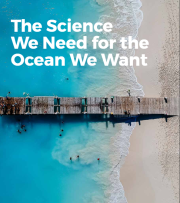- Wenxi Zhu & Somkiat Khokiattiwong
- Posted on April 5, 2023
- Jakarta, Indonesia
On 5 April 2023, Member States at the 14th Intergovernmental Session of the IOC Sub-Commission for the Western Pacific (4-6 April 2023, Jakarta, Indonesia) expressed their unanimous support to the State Key Laboratory of Marine Pollution (SKLMP) in the City University of Hong Kong (CityU) for hosting a Regional Training and Research Center focusing on Coastal Contaminant Monitoring and Marine Innovative Technologies (RTRC-Coastal COMMIT).
Marine pollution poses significant threats to our marine biodiversity and natural resources, as well as blue economy and sustainability. The marine environment in the Western Pacific is under ever-mounting anthropogenic stresses wrought by population growth, coastal development, overharvest, and pollution. International cooperation among countries and advances in ocean science and technology are essential to address such unprecedented challenges.
The Sub-Commission and IOC/UNESCO have been endeavoring to assist countries and institutions in the region to increase research capacity and transfer marine technology toward the attainment of Sustainable Development Goals (SDGs), in particular SDG 14: Conserve and sustainably use the ocean, seas and marine resources. The UN Decade of Ocean Science for Sustainable Development (2021-2030) considers capacity development as an essential tenet for achieving “the science we need for the ocean we want”. To support the Decade, the Sub-Commission is committed to “Accelerating capacity development transformations in the Western Pacific – Regional Network of Training and Research Centers (RTRCs) on Marine Science“.
The SKLMP in the City University of Hong Kong (CityU) has been a leader in marine research, equipped with a team of world-class researchers and state-of-the-art research facilities for marine environment protection. It is dedicated to developing multidisciplinary and innovative solutions to imminent marine pollution problems that pose a significant threat to our environment and public health.
The RTRC-Coastal COMMIT will assist countries, particularly the developing nations in the region, in strengthening their monitoring capacity for marine pollution focusing on chemical contaminants monitoring, phycotoxin producing algal species monitoring; promote the development of marine innovation technologies, and facilitate international research collaboration to promote marine environmental protection and sustainable development.
The RTRC -Coastal COMMIT will provide high-quality, professional and tailored training and research opportunities, to all countries, particularly those developing countries, in the region and beyond. In synergy with other RTRCs in the region, it has a big role to play and will contribute greatly to the achievement of the UN Ocean Decade Societal Outcomes: a clean ocean, a healthy and resilient ocean, and a productive ocean.
“SKLMP is undeniably well positioned and more than capable to host the RTRC-Coastal COMMIT,” said Gil Jacinto from the Philippines at the Session. “ We are very grateful for all countries’ support and guidance throughout the evaluation process, and providing us this opportunity to serve and work with the ocean science and environment communities in the region,” Kenneth Mei Yee Leung, the SKLMP Director, expressed his gratitude to all delegates at the meeting.




